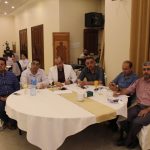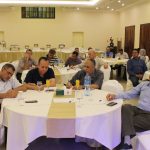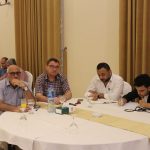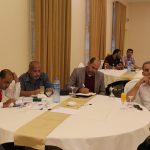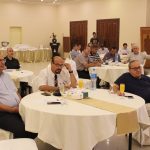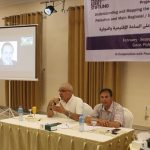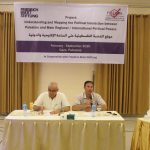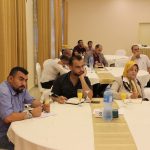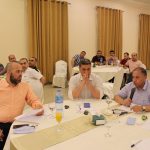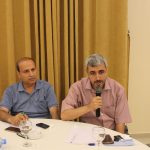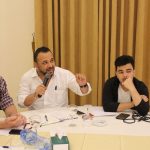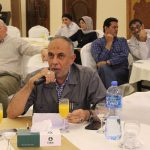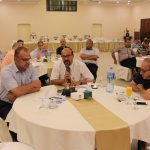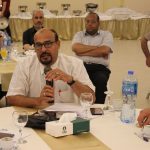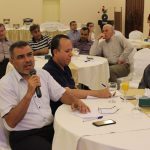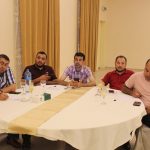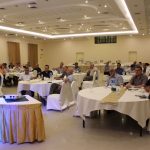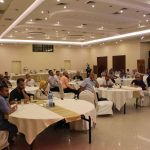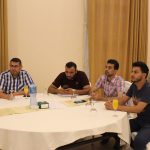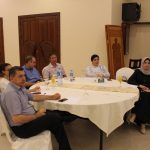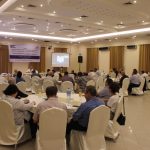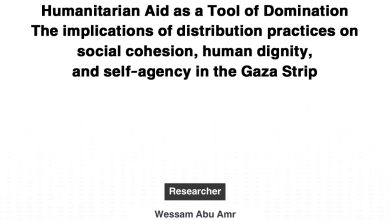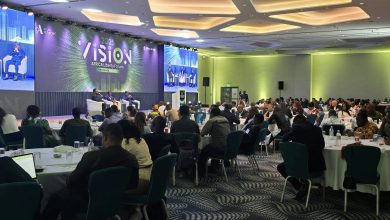Roundtable discussion with Oraib Al Rantawi about “Jordan and The Israeli Annexation Plan: The status quo and consequences.”
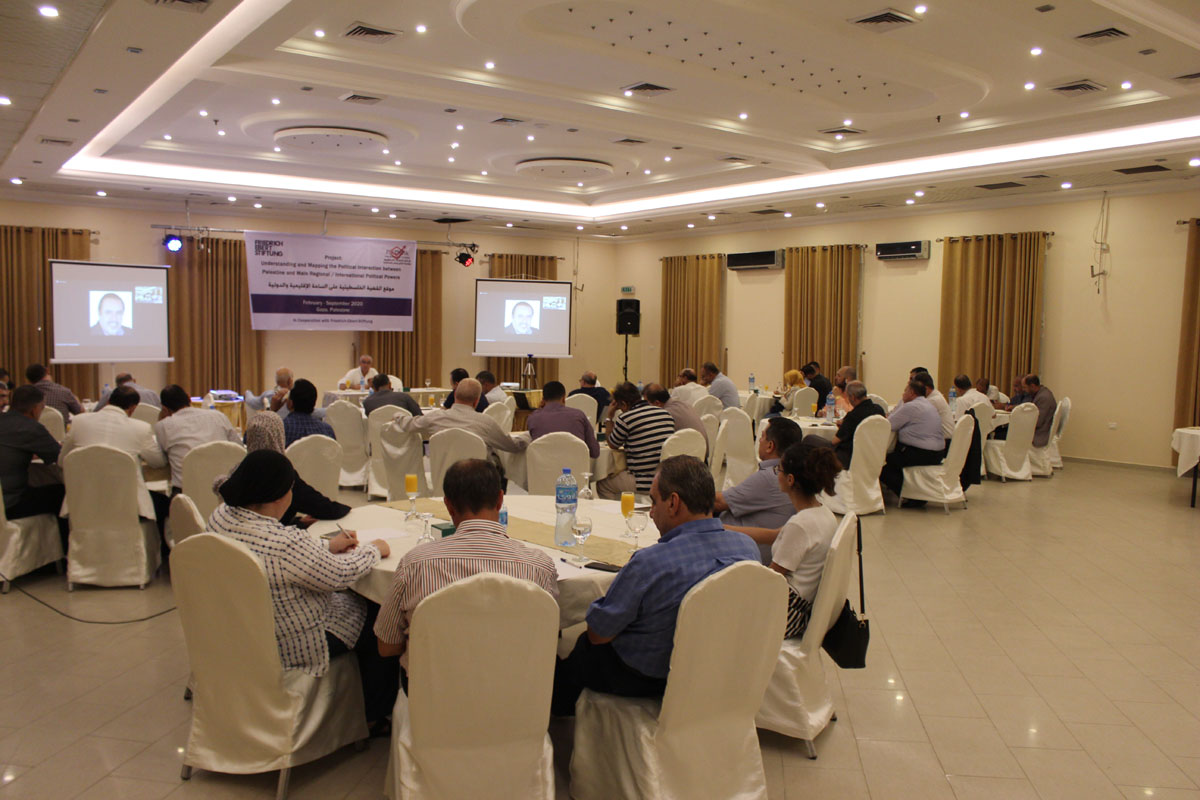
Pal-Think for Strategic Studies, in partnership with the German Friedrich Ebert Foundation, organized a roundtable discussion entitled “Jordan and the Israeli annexation Plan; the status quo and consequences. Hosting over Zoom Oraib Al Rantawi, founder and director of Al-Quds Center for Political Studies in Amman – Jordan, and attended by an audience of writers, researchers, politicians and youth activists, the roundtable discussion aimed at reinforcing the community dialogue on issues of contemporary concern.
The session was opened by Pal-Think’s director, Mr. Omar Shaban, welcoming the guests and highlighting that the annexation plan was not completed, it is still attracting the attention of decision-makers in the US, Europe, Israel, Arab neighbours and Palestine, however. Following his speech, there was a highlight on that Jordan stance was strict in its refusal of the plan due to that Jordan is greatly affected by the political and geographical level of Palestine. In addition, the collapse of the Palestinian state directly affects Jordan and it is believed that one of the reasons why Israeli government postponed the annexation, after the strong Palestinian stand of rejection, was Jordan’s stand.
Program Manager of the Friedrich Ebert Foundation in the Gaza Strip, Dr. Usama Antar, welcomed the attendees and pointed out that Israeli annexation plan, even if postponed, would be partially achieved. Plus, Jordan could be most affected because of this plan and the knowledge of the Jordanian political and societal position had always been important to know how to unify efforts between Jordan and Palestine to stop the plan and to limit its impact on the two-state solution and the Palestinian demographic structure.
Mr. Oraib Al Rentawi, director of the Al Quds Center for Political Studies, asserted that there were several factors that pushed Jordan’s decision-maker to reject the annexation plan; these factors affected Jordan, its agency and its future. Since King Abdullah’s coming, an understanding has been reached on Jordan’s interests in the final solution, and this definition has stressed that the establishment of a Palestinian state with East Jerusalem as its capital serves not only the Palestinians but also constitutes the first line of defence for Jordan’s security and identity. Also, it is the means to end the plans of some Israeli right-wing to turn the conflict instead of being a Palestinian Israeli to an Israeli Jordanian.
He added that the deal of the century and its consequences left Jordan alone in dealing with the Palestinian refugees’ file in Jordan, which is 4.4 million. As well as, without Jordan’s effort, we might have lost the battle to preserve UNRWA as a symbol of asylum and because it provided services to refugees. Another factor is the Hashemite care of Jerusalem sanctuaries, to the point that they cannot do their duties because of Israeli policies. As for Annexation, it strikes the peace treaty that demarcated Israel-Jordan, except for the two-side border that was excluded for final-solution negotiations. It was agreed to maintain its legal status until that moment.
Also, he stated that if the annexation took place, the Palestinian Authority might not be able to complete its job and might collapse and thus go to open scenarios: Intifada, military action, social violence, or alienation, and perhaps religious movements control the West Bank, which is not welcomed in Amman. Besides, Jordan has extensive experience in dealing with successive American administrations, but what is new with Trump’s administration Jordan also has extensive experience in dealing with successive American administrations that it is biased not only to the Israeli story but is biased to the Israeli right’s story, and this administration showed for the first time tolerance toward harming the fundamental Jordanian interests. For the first time in Jordan’s history, his great threatened cities come from the camp of allies rather than from the camp of traditional opponents, which is not very frequent in history, but it is happening now.
Moreover, he insists by referring to that the state of Arab exposure that worries Jordan, especially as its role on the regional level has been declining in the past years, an element that is calculated to the Jordanian stand, and we have to support the Jordanian king’s sentence to the American Congress: “Don’t take Jordan for granted”, this stand was expressed in practice, as Jordan postponed signing the gas initiative in the east of the Mediterranean because of the atmosphere of annexation and the deal of the century, and Jordan, in its diplomatic effort, similar to the bee’s cell, was able to prevent Israel from using Tamnaa airport, which threatens the safety of Aqaba airport.
Then Al Rentawi followed that Jordanian-Palestinian coordination is at its best, not mentioning whether it was even in the agreement of February 1985. Now relations are open, contacts are almost daily and there are official mutual visits.
Additionally, Al Rentawi pointed out that there are some necessary changes like Jordan’s transition from dependence to self-reliance, and it has to look at the inside and to promote popular participation, the election of a multi-party parliament and the creation of a strong government.
Plus, he said that what is worrying is the stand of the UAE, because it it known that the UAE is moving toward normalization with Israel in a real way as the UAE and Israel are the strongest economies and armies in the region and enjoy the strongest relationship with the United States in the Middle East, which may weaken Jordan’s stand.
Then he stressed that Jordan has many strong points such as it has important friends in the United States and the mass media, decision-making institutions besides public opinion industry institutions show a great understanding of the Jordanian situation. More importantly, Jordan is based on a solid Palestinian stand, as the Palestinians have united in their rejection of the deal of the century despite their deep Fatah-Hamas division.
After that, Al Rentawi added that the strong popular attitude that pressures Jordan’s attitude toward the new American and Israeli plan of annexation and politics is the same as Jordan’s clans. If Jordan’s ancestors use it and allow the people to express themselves, things will be settled.
Over and above, Al-Rentawi clarified that Jordan has to do several things, the most important of which is to look at the Jordanian internal affairs, play with their strong points, document the Palestinian-Jordanian relations and intensify the movement on the local and international arena.
Then he continued that there is a world awakening against racism that began with the murder of George Floyd in America, and the Palestinians should use it as Sharon wanted to do when he wanted to include the Palestinians in the international terrorism in 2001. There must be a conscious and well-informed Palestinian movement that uses the appropriate tools and discourse in the face of racism, slavery and occupation.
Finally, he concluded that the Arab region after the Corona pandemic will witness a new wave of Arab Spring revolutions as the failed states will become more unsuccessful, the countries with a sliding economy will slide, the gap between the rich and the poor will widen, the armies of the unemployed will expand and poverty will spread even more. All the factors that fueled the Arab Spring revolutions are there.
By the end of the session, the participants’ questions were raised about the Jordanian reactions in case of implementing the annexation plan, the effect of the annexation plan on the Palestinian-Jordanian relations, and its effect on the Jordanian-US relations.

